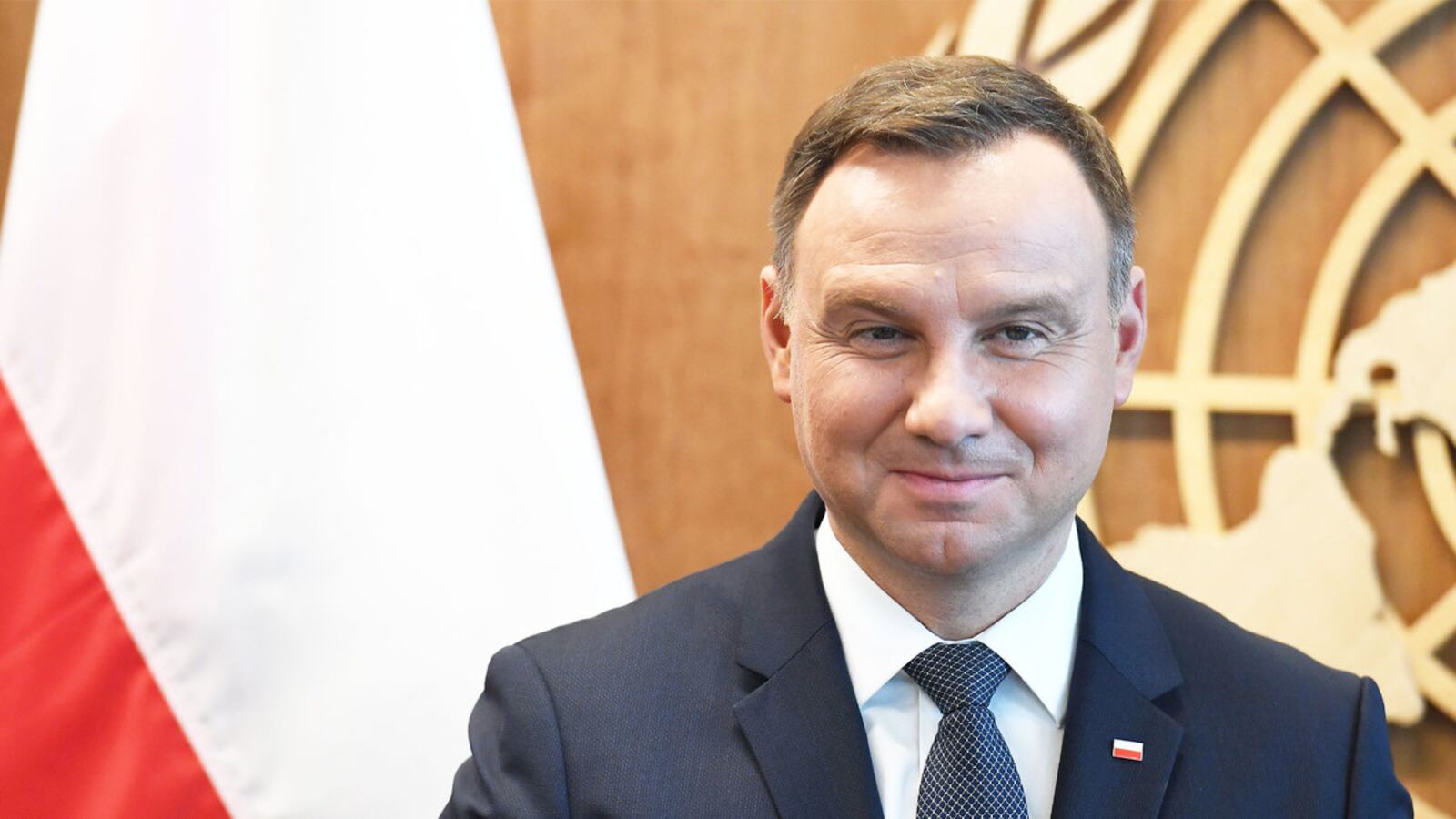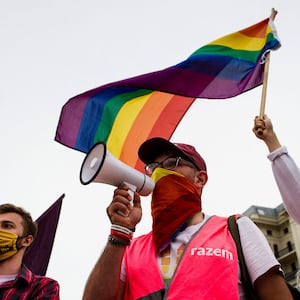When activist Bartosz Staszewski was invited to meet with Polish President Andrzej Duda a few weeks ago, he tried to make Duda look at three portraits: one was of a young trans activist called Milo who’d jumped off a bridge in Warsaw last year; the other pictures were of two boys, Dominic and Kacper, who’d hanged themselves after becoming victims of homophobic bullying at school.
Staszewski was only too aware that Duda was using the meeting with LGBTQ activists as a token effort in his re-election campaign to show an open mind. Staszewski told the president he hoped he’d see these kids in his nightmares.
On Sunday, Duda won his narrow re-election victory after running a hateful campaign that hinged on fear mongering about queer people and their supposed “ideology” threatening Catholic Poland.
Poland’s nationalist right embraced this strategy long ago, but it has been using it hyper-aggressively to try to win elections since last February, when the socially liberal mayor of Warsaw, Rafał Trzaskowski, signed a “tolerance declaration” for LGBTQ people. Significantly, Trzaskowski was Duda’s opponent in the presidential election run-off.
In the European parliamentary elections and now these national elections, Poland’s right-wing Law and Justice party campaigned by accusing LGBTQ people of threatening Polish culture. Duda took their strategy even further, claiming that LGBTQ people aren’t people, using the word “ideology” to dehumanize them. According to Staszewski, Duda responded to the portraits by saying that he would continue to fight “LGBT ideology” and that the teenagers “don’t need equal rights, but a psychologist.”
Hubert Sobecki, a longtime activist for the LGBTQ group Love Does Not Exclude, said that since the elections on Sunday, he’s heard from many couples who’ve decided to leave Poland and try to make a new life elsewhere in the European Union. “Many people were postponing their decision because they had hope in this election,” he says. The result “is the final straw.”
The homophobic smear campaigns of the past 18 months have correlated with a spike in hate crimes. Magdalena Swider from Campaign against Homophobia tells us that she has been receiving more and more reports of people being physically attacked or having their apartments vandalized because they are perceived to be LGBTQ.
Homophobic hate crimes are unlikely to be reported or prosecuted, given that Poland’s hate crime legislation doesn’t protect sexual orientation or gender identity.
The mental health of LGBTQ people is at collective risk, too. In 2016, Campaign against Homophobia estimated that 70 percent of school-aged LGBTQ youth have had suicidal thoughts. They will release a new study in 2021.
Kosma Kolodziej from Nicolaus Copernicus University has been monitoring the situation of LGBTQ people under the age of 25 for the past five years. His 2020 study estimates that 84 percent of young LGBTQ people are now having suicidal thoughts. Kolodziej’s research also estimates that the number of LGBTQ teens in Poland who attempt suicide has increased from 30 percent in 2016 to 45 percent in 2020.
“This year, a young model, who was already in his twenties committed suicide as well,” Swider says. “He said he cannot live in this country, where people don’t respect him.”
There are no more big elections in Poland planned any time soon, which gives Swider hope that “maybe the hate speech will go down.” But there are still up to 100 local councils (together making up one third of the country’s territory), that are being lobbied by Catholic fundamentalist groups and have recently declared themselves to be “free from LGBT ideology.” Some of these councils have already sent resolutions or brochures from the fundamentalist group Ordo Iuris to the head teachers of their local schools.
Campaign against Homophobia has reported that 30 percent of homophobic and transphobic bullying against young people happens in schools. The situation has not been helped by the fact that the actual curriculum in Polish state education has mostly ignored LGBTQ issues so far. These days, schools are even less capable of offering support. According to Swider, “there is this real threat for teachers and workers in schools that if they mention anything about LGBTQ people, they will get fired.”
Last year, Campaign against Homophobia was preparing its annual “Rainbow Friday” event to show support for LGBTQ kids in 200 schools. But then the Ministry of Education sent out letters to the schools to tell them that they would be sued if they take part in “Rainbow Friday.”
The threat had no legal grounds, but many teachers were scared. “We’ve heard some ridiculous stories,” says Swider. In one kindergarten, “children were painting rainbows and the teacher would come up and say: you cannot draw that, or I will be in trouble if anyone else sees it.” Agata Teutsch, who runs a women’s rights organization that provides anti-bullying training in Polish schools, is worried that the education system will grow more hostile to LGBTQ youth. She notes that the government is planning budget cuts. ””Inconvenient teachers” will be fired first,” she says.
The 2016 Campaign against Homophobia report also founded that many LGBTQ teens under the age of 18 do not feel accepted by their families. Only 12 percent of the teens surveyed said they felt accepted by their fathers. Psychological support for LGBTQ youth “are almost exclusively based on NGOs, self-help groups and community support,” says Sobecki. What this often looks like is that “there will be a therapist in one city who we know is helpful and the local LGBTQ organization will have their mobile number.”
On Tuesday morning, one day after President Duda was declared the winner of the presidential elections, police officers took young trans activist Malgorzata Szutowicz from her friend’s apartment. They didn’t give her a reason for her arrest, refused to give information about where they were taking her, escorted her to an unmarked car and drove her away.
Szutowicz is a member of a queer anarchist collective called Stop Bzdurom (Stop the Bullshit), which was founded last year to oppose far-right smear campaigns about homosexuality and abortion. The prosecutor wanted to charge Szutowicz for hooliganism because she’d taken part in a protest against a campaign van that was linking queer people to pedophilia. Szutowicz was released by the court on Wednesday after the judge found there was not enough evidence to keep her in jail.
“We have had several situations like this, where police arrested pro democracy activists like this, without grounds, in the past months,” says Sobecki. But “never this brazenly.”
“Two years back, we were really trying to change the laws in our favor,” said Swider, referring to, among other things, her organization’s past campaign to make school curriculums more LGBTQ friendly. But these days, where the wannabe-autocrat Law and Justice party is in power and Duda is nicknamed their “ballpoint pen,” because he signs whatever they give him, she said, “We are kind of trying to protect the existing laws from being dismantled.”
Two years ago, Campaign against Homophobia went to court against a printer, who refused to print banners for an LGBTQ group because he didn’t want to “promote” queer rights.
Initially, Poland’s Supreme Court ruled in their favor, agreeing that the printer was acting unlawfully by discriminating because of sexual orientation. But then, Swider recalls, “The prosecutor general just said: Okay, well then the whole article that you are basing your argument on is unconstitutional,” And the Constitutional Tribunal, which is under the full control of the Law and Justice party, agreed with the prosecutor.






